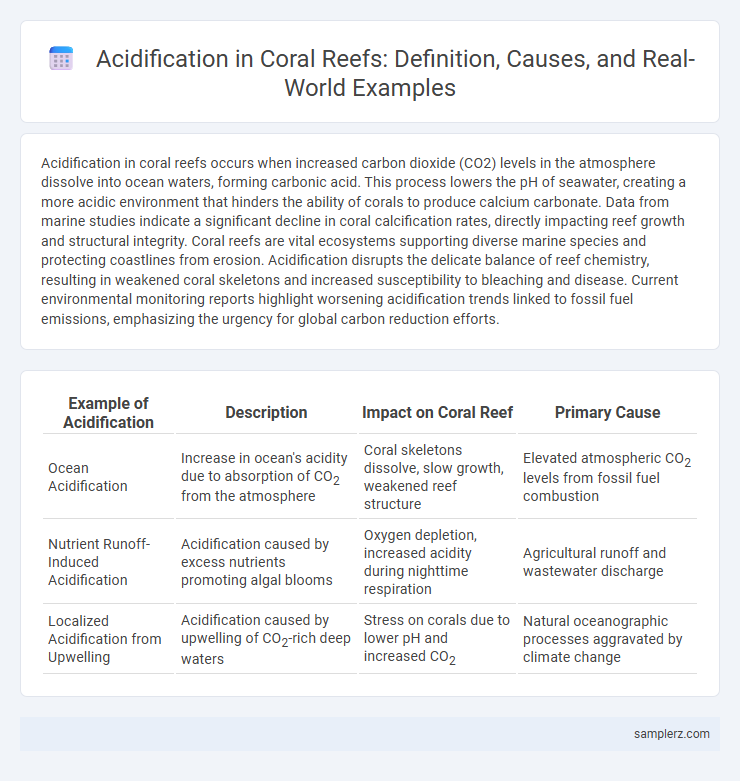Acidification in coral reefs occurs when increased carbon dioxide (CO2) levels in the atmosphere dissolve into ocean waters, forming carbonic acid. This process lowers the pH of seawater, creating a more acidic environment that hinders the ability of corals to produce calcium carbonate. Data from marine studies indicate a significant decline in coral calcification rates, directly impacting reef growth and structural integrity. Coral reefs are vital ecosystems supporting diverse marine species and protecting coastlines from erosion. Acidification disrupts the delicate balance of reef chemistry, resulting in weakened coral skeletons and increased susceptibility to bleaching and disease. Current environmental monitoring reports highlight worsening acidification trends linked to fossil fuel emissions, emphasizing the urgency for global carbon reduction efforts.
Table of Comparison
| Example of Acidification | Description | Impact on Coral Reef | Primary Cause |
|---|---|---|---|
| Ocean Acidification | Increase in ocean's acidity due to absorption of CO2 from the atmosphere | Coral skeletons dissolve, slow growth, weakened reef structure | Elevated atmospheric CO2 levels from fossil fuel combustion |
| Nutrient Runoff-Induced Acidification | Acidification caused by excess nutrients promoting algal blooms | Oxygen depletion, increased acidity during nighttime respiration | Agricultural runoff and wastewater discharge |
| Localized Acidification from Upwelling | Acidification caused by upwelling of CO2-rich deep waters | Stress on corals due to lower pH and increased CO2 | Natural oceanographic processes aggravated by climate change |
Understanding Coral Reef Acidification
Coral reef acidification occurs when increased atmospheric CO2 dissolves into seawater, lowering pH levels and disrupting calcium carbonate formation essential for coral skeletons. This process impairs coral growth and structural integrity, leading to weakened reef ecosystems. Monitoring pH variations and carbonate ion concentrations is crucial for understanding and mitigating the impacts of acidification on coral reefs.
Causes of Acidification in Coral Reefs
Rising atmospheric carbon dioxide levels lead to increased absorption of CO2 by ocean waters, causing chemical reactions that lower the pH and result in ocean acidification. This acidification reduces carbonate ion availability, essential for coral skeleton formation, weakening the structural integrity of coral reefs. Other contributing factors include nutrient runoff from agriculture and pollution, which exacerbate reef stress and further disrupt acid-base balance in coral environments.
Ocean Acidification and Coral Health
Ocean acidification, caused by increased CO2 absorption, lowers the pH of seawater, leading to reduced carbonate ion availability essential for coral skeleton formation. This chemical imbalance weakens coral structures, making reefs more susceptible to erosion and bleaching. Declining coral health disrupts marine biodiversity and compromises the ecosystem services that reefs provide.
Chemical Processes Behind Coral Reef Acidification
Coral reef acidification occurs when increased atmospheric CO2 dissolves in seawater, forming carbonic acid that lowers the pH of the ocean. This chemical process reduces the availability of carbonate ions, essential for coral calcification and skeletal formation. The disruption of carbonate ion balance impairs coral growth and resilience, threatening reef ecosystems worldwide.
Notable Examples of Acidified Coral Reefs
Notable examples of acidified coral reefs include the Great Barrier Reef in Australia, where increased CO2 levels have led to significant declines in coral calcification rates. The Florida Keys reef system has also experienced severe acidification, resulting in reduced skeletal density and heightened vulnerability to erosion. These changes compromise reef resilience, threatening biodiversity and the livelihoods dependent on these marine ecosystems.
Impacts of Acidification on Marine Biodiversity
Ocean acidification, driven by increased CO2 absorption, disrupts the calcium carbonate formation essential for coral reef growth and structural integrity. This chemical imbalance reduces habitat complexity, leading to declines in fish populations and marine species diversity that depend on reefs for shelter and food. The resulting loss of biodiversity threatens ecosystem resilience, fisheries, and coastal protection services provided by healthy coral reef systems.
Coral Bleaching Linked to Acidic Waters
Coral bleaching occurs as rising levels of carbon dioxide increase ocean acidity, disrupting calcium carbonate formation crucial for coral skeletons. Acidic waters weaken coral reefs' structural integrity, making them more susceptible to temperature-induced stress and the loss of symbiotic algae. This environmental shift severely diminishes biodiversity and the natural barrier function of coral ecosystems.
Local Case Studies of Coral Acidification
Local case studies in the Great Barrier Reef reveal significant coral acidification due to increased CO2 absorption, leading to weakened calcium carbonate skeletons. In Florida's coral reefs, acidification has resulted in reduced coral growth rates and heightened susceptibility to disease. Research in the Pacific Islands shows that acidification disrupts symbiotic relationships, impairing reef resilience and biodiversity.
Acidification’s Effect on Coral Growth and Reproduction
Ocean acidification reduces calcium carbonate availability, hindering coral growth and skeletal formation. Lower pH levels disrupt coral reproduction by impairing gamete development and larval survival rates. This degradation of coral health threatens reef biodiversity and ecosystem resilience.
Mitigation Strategies for Coral Reef Acidification
Mitigation strategies for coral reef acidification include enhancing local water quality by reducing nutrient and sediment runoff to improve coral resilience. Implementing marine protected areas helps preserve biodiversity and supports coral recovery from acidification stress. Restoration efforts, such as cultivating acidification-resistant coral species, offer promising solutions for maintaining reef ecosystems under changing ocean chemistry.

example of acidification in coral reef Infographic
 samplerz.com
samplerz.com